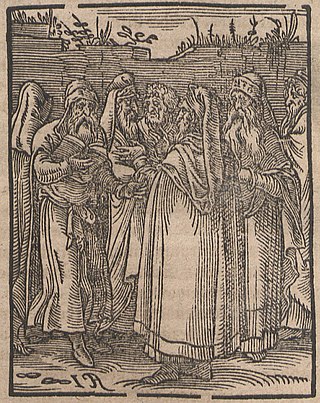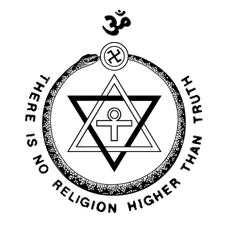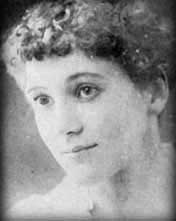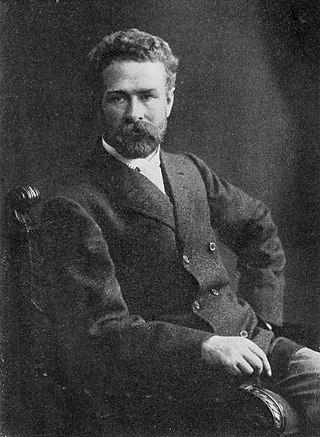
Kabbalah is an esoteric method, discipline and school of thought in Jewish mysticism. A traditional Kabbalist is called a Mekubbal. The definition of Kabbalah varies according to the tradition and aims of those following it, from its origin in medieval Judaism to its later adaptations in Western esotericism. Jewish Kabbalah is a set of esoteric teachings meant to explain the relationship between the unchanging, eternal God—the mysterious Ein Sof —and the mortal, finite universe. It forms the foundation of mystical religious interpretations within Judaism.
The occult, in the broadest sense, is a category of esoteric supernatural beliefs and practices which generally fall outside the scope of organized religion and science, encompassing phenomena involving otherworldly agency, such as magic and mysticism and their varied spells. It can also refer to supernatural ideas like extra-sensory perception and parapsychology.

Christian theosophy, also known as Boehmian theosophy and theosophy, refers to a range of positions within Christianity that focus on the attainment of direct, unmediated knowledge of the nature of divinity and the origin and purpose of the universe. They have been characterized as mystical philosophies. Theosophy is considered part of Western esotericism, which believes that hidden knowledge or wisdom from the ancient past offers a path to enlightenment and salvation.

William Butler Yeats was an Irish poet, dramatist, writer, and politician. One of the foremost figures of 20th-century literature in the English-speaking canon, he was a driving force behind the Irish Literary Revival and became a pillar of the Irish literary establishment who helped to found the Abbey Theatre. In his later years, he served two terms as a Senator of the Irish Free State.

The Theosophical Society is the organisational body of Theosophy, an esoteric new religious movement. It was founded in New York City, US in 1875. Among its founders were Helena Blavatsky, a Russian mystic and the principal thinker of the Theosophy movement, and Henry Steel Olcott, its first president. It draws upon a wide array of influences among them older European philosophies and movements such as Neoplatonism and occultism, as well as parts of Asian religious traditions such as Hinduism, Buddhism, and Islam.

Alice Ann Bailey was a writer of more than twenty-four books on theosophical subjects, and was one of the first writers to use the term New Age. Bailey was born as Alice La Trobe-Bateman, in Manchester, England. She moved to the United States in 1907, where she spent most of her life as a writer and teacher.

Jakob Böhme was a German philosopher, Christian mystic, and Lutheran Protestant theologian. He was considered an original thinker by many of his contemporaries within the Lutheran tradition, and his first book, commonly known as Aurora, caused a great scandal. In contemporary English, his name may be spelled Jacob Boehme ; in seventeenth-century England it was also spelled Behmen, approximating the contemporary English pronunciation of the German Böhme.
Academic study of Jewish mysticism, especially since Gershom Scholem's Major Trends in Jewish Mysticism (1941), draws distinctions between different forms of mysticism which were practiced in different eras of Jewish history. Of these, Kabbalah, which emerged in 12th-century Europe, is the most well known, but it is not the only typological form, nor was it the first form which emerged. Among the previous forms were Merkabah mysticism, and Ashkenazi Hasidim around the time of the emergence of Kabbalah.
Egregore is an esoteric concept representing a non-physical entity that arises from the collective thoughts of a distinct group of people.

Esoteric Christianity is an approach to Christianity which features "secret traditions" that require an initiation to learn or understand. The term esoteric was coined in the 17th century and derives from the Greek ἐσωτερικός.

Benedict Lust was a German-born American who was one of the founders of naturopathic medicine in the first decades of the twentieth century.

Florence Beatrice Emery was a British West End leading actress, composer and director. She was also a women's rights activist, journalist, educator, singer, novelist, and leader of the occult order, the Hermetic Order of the Golden Dawn. She was a friend and collaborator of Nobel laureate William Butler Yeats, poet Ezra Pound, playwright Oscar Wilde, artists Aubrey Beardsley and Pamela Colman Smith, Masonic scholar Arthur Edward Waite, theatrical producer Annie Horniman, and many other literati of London's fin de siècle era, and even by their standards she was "the bohemian's bohemian". Though not as well known as some of her contemporaries and successors, Farr was a "first-wave" feminist of the late 19th and early 20th centuries; she publicly advocated for suffrage, workplace equality, and equal protection under the law for women, writing a book and many articles in intellectual journals on the rights of "the new woman".

Hermetic Qabalah is a Western esoteric tradition involving mysticism and the occult. It is the underlying philosophy and framework for magical societies such as the Golden Dawn, Thelemic orders, mystical-religious societies such as the Builders of the Adytum and the Fellowship of the Rosy Cross, and is a precursor to the Neopagan, Wiccan and New Age movements. The Hermetic Qabalah is the basis for Qliphothic Qabala as studied by left-hand path orders, such as the Typhonian Order.

Hofämterspiel, one of the earliest packs of playing cards on record preserved in its entirety with all 48 cards intact, is a major 15th-century medieval handmade deck commissioned by Ladislaus the Posthumous, King of Hungary and Bohemia and Duke of Austria from 1453 to 1457. It was found among the great collection of art treasures of Archduke Ferdinand II of Tirol in castle Ambras, Austria, together with another called Ambraser Hofjagdspiel. Their heraldic suits represent, to an extent, "the political and dynastic relationships in Central Europe in middle of the 15th century" and are "of a quality unsurpassed at this early date."
Kabbalah, the central system in Jewish mysticism, uses anthropomorphic mythic symbols to metaphorically describe manifestations of God in Judaism. Based on the verses "God created man in his own image, in the image of God created he him; male and female created he them" and "from my flesh shall I see God", Kabbalah uses the form of the human body to describe the structure of the human soul, and the nature of supernal Divine emanations. A particular concern of Kabbalah is sexual unity between male and female potencies in Divinity on high, depicted as interaction of the two sides in the sephirot, between archetypal partzufim, and the redemption of the exiled Shekhinah from captivity among the impure forces below.

Mark. H. Gelber is an American-Israeli scholar of comparative literature and German-Jewish literature and culture. He received his B.A. magna cum laude and with high honors in Letters and German. He also studied at the University of Bonn, the University of Grenoble, and Tel Aviv University. He was accepted for graduate studies as a Lewis Farmington Fellow in the Humanities and Social Sciences at Yale University and he received his M.A., M.Phil., and Ph.D. from Yale University. In 1980 he accepted an appointment as post-doctoral lecturer at Ben-Gurion University of the Negev, Beer Sheva, in the Department of Foreign Literatures and Linguistics. Except for guest professorships and research fellowships abroad, he has been affiliated there since that time. His research topics include: German-Jewish literature and culture, the literature of exile, cultural Zionism, early Zionist literature and journalism, literary anti-Semitism, autobiography and biography, and literary reception. He lectures frequently at international meetings and conferences in Israel, Europe, China, and the United States. He is presently professor emeritus with active researcher status.

Adolf Just (born 8 August 1859, Lüthorst near Dassel, Kingdom of Hanover; died 20 January 1936, Blankenburg was a German naturopath. He was the founder of the sanatorium Jungborn in Eckertal.

Theosophy is a religion established in the United States during the late 19th century. It was founded primarily by the Russian Helena Blavatsky and draws its teachings predominantly from Blavatsky's writings. Categorized by scholars of religion as both a new religious movement and as part of the occultist stream of Western esotericism, it draws upon both older European philosophies such as Neoplatonism and Indian originated religions such as Hinduism and Buddhism.
According to some literary and religious studies scholars, modern Theosophy had a certain influence on contemporary literature, particularly in forms of genre fiction such as fantasy and science fiction. Researchers claim that Theosophy has significantly influenced the Irish literary renaissance of the late 19th and early 20th centuries, notably in such figures as W. B. Yeats and G. W. Russell.














